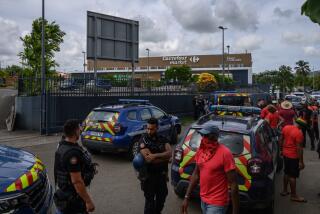Students Riot in Paris : 100,000 Join Largest March Since ’68 Unrest
- Share via
PARIS — An outbreak of violence today forced police to order more than 100,000 high school students to halt a march through Paris, the biggest student protest in France since 1968 and the largest protest yet in a campaign for better education.
The main throng of marchers was orderly, but several hundred youths on the fringes of the crowd smashed windows, set fire to cars, looted a clothing store, stoned police and attacked journalists. Police made at least 20 arrests and dispersed troublemakers with tear gas and a water cannon.
As the marchers began to disperse at nightfall, Education Minister Lionel Jospin emerged from talks with student leaders to announce an “emergency plan” to improve France’s high schools. He said details will be worked out in negotiations involving students and government officials.
A separate delegation of 20 students met with President Francois Mitterrand.
In dozens of smaller cities across France, more than 150,000 other students joined marches coinciding with the Paris protest.
About two hours after the march began, Paris Police Chief Pierre Verbrugghe demanded that student leaders order the protesters to disperse. He said the throng would not be allowed to cross from the Left Bank of the Seine River to the planned ending point on the Champs Elysees.
Beneath banners demanding more government spending on their schools, the Paris marchers set out from the Place de la Bastille, where revolutionaries stormed the Bastille prison 201 years ago. Their destination was the Rond Point, a traffic circle four miles away on the Champs Elysees.
Streets and subway stations along much of the route were closed by police, paralyzing transportation in a large section of central Paris.
The dozens of previous student marches and rallies across France over the last four weeks have been peaceful, except for sporadic vandalism blamed by student leaders on provocateurs.
Verbrugghe said that he was deploying 5,000 officers to cope with the march but that they were ordered to avoid force against anyone demonstrating peacefully.
Scores of off-duty members of a major police union, wearing civilian clothes, joined student leaders at the head of the march and offered to assist in any negotiations with uniformed police.
Also among the marchers were officials of industrial trade unions and several national teachers’ associations.
Throughout the morning, hundreds of youths poured out of trains at Paris railway stations. In most cases, the out-of-town protesters had either forced their way onto the trains without paying or had obtained discounts of 60% to 70% after blockading tracks at provincial stations last week.
In Caen, students were allowed to board a train after being asked to pay whatever they could afford.
In Lyon, students rented an entire train with $480 raised through public donations during recent protests. And in Grenoble, a regional administrative council provided funds to carry about 1,000 students on a train to Paris.
The students want more government spending to improve security, upgrade substandard facilities, modernize curriculums and hire more teachers.
More to Read
Sign up for Essential California
The most important California stories and recommendations in your inbox every morning.
You may occasionally receive promotional content from the Los Angeles Times.













